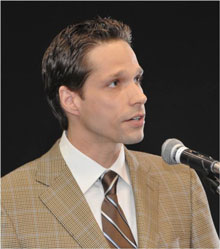How governments can respond to fracking operations

Government administrators are closely watching the growing use of hydraulic fracturing (also known as hydrofracking) to produce energy in their backyards. Hydraulic fracturing is the extraction of natural gas from shale rock by pumping large amounts of pressurized water and chemicals into horizontal drill wells. The process is controversial because it generates large amounts of fluid wastes and risks contaminating bodies of water and streams.
The U.S. Environmental Protection Agency (EPA) has recently weighed in on the topic via a dedicated web page and a document draft that covers guidance for issuing permits for oil and gas hydraulic fracturing using diesel fuels.
A government science report from the Washington-based National Research Council, meanwhile, says the process of hydraulic fracturing to extract natural gas does not pose a high risk for setting off earthquakes, but other kinds of energy-related drilling can make the ground appear to shake.
Jed Morey has written extensively about hydrofracking. He is the publisher of the Long Island Press, an alternative weekly newspaper with a circulation of 85,000, and www.longislandpress.com. Here are Morey’s views on how government administrators can respond when hydrofracking operations set up shop in their jurisdiction.
Govpro: When hydraulic fracking crews want to start drilling in a community, what should government officials/administrators in that community do?
Jed Morey: Although hydraulic fracturing has been around for decades, the methodology and chemical mixture employed in shale plays today is relatively new. Because of this, there is little empirical evidence to suggest that this process is more or less deleterious than vertical drilling operations. However, there is mounting anecdotal evidence that indicates hydrofracking is far more harmful to the environment than initially anticipated. There is no substitute for first-hand exploration of the issue.
Communicating with residents and officials in communities that have had drilling operations in their communities for more than five years is critical. Environmental advocacy groups have also had an opportunity to gauge the impact of these operations and are issuing fairly comprehensive reports with respect to the environmental impact and financial impact to municipalities. Therefore, the single most important thing a government body can do when faced with the potential of drilling in its jurisdiction is to issue a multi-year moratorium on fracking until all available research has been vetted.
Govpro: Do government water, sewer, highway, waste treatment, public works and other department administrators have more work and higher expenses when a fracking operation becomes active in their communities?
Jed Morey: At the outset, there are relatively few direct correlations between hydraulic fracturing operations and increased municipal costs. Over time, however, the persistent environmental and transportation issues related to ongoing operations become apparent. One hidden cost that is rarely taken into account is the toll taken on transportation routes as it is estimated that each individual drilling site requires nearly 13,000 diesel truck trips. Because the natural gas yield from horizontal drilling sites is far less than vertical drilling operations, companies typically execute myriad contracts in a relatively small geographic area, thus magnifying the number of trucks on the road and, subsequently, the wear and tear on the highway system.
Because of the great number of drilling sites, water purification, which is done onsite for the purpose of re-using water in the operation, is an unwieldy aspect of hydrofracking. To wit, Boenning and Scattergood, an investment-banking firm based in West Conshohocken, Pa., hosted a symposium for the water industry on water treatment in the Marcellus Shale [formation] in July 2011. Their analysts concluded, “There is no single solution or asset which will be the winner in the water issues of shale plays. The variability of geology, topography and location will require a set of assets to provide services for water management.“
This inherent variability in the more difficult shale plays such as Marcellus, means that the containment of contaminants utilized in the fracking process is impossible. As we have witnessed in places such as Wyoming and Pennsylvania, over time the environmental costs ultimately borne by municipalities and communities that house fracking operations are immense.





















Nice article, however short
Nice article, however short on technical data and facts. He states, “mounting anecdotal evidence that indicates hydrofracking is far more harmful to the environment”. OK, state the facts, present data from local citiy and county authorities outlining the harm, not a university professor.
He states local transportation is taking a toll. Very few loads going to or from a drill sites require permits, therefore, are normal loads. The ecomonic benefit to the local communities is substantial, and the 30,000 trips “per site” could in no way be accurate.
The biggest inaccuratcy is the statement that, “natural gas yield from horizontal drilling sites is far less than vertical drilling” is completely off base. If that was correct, why would a “for profit” firm drill horizontal instead of vertical.
Living in Oklahoma and being more than a little knowledgable about the drilling both types of wells, the economic benifit of going horizontal is enormous.
The author uses phrases like, “As we have witnessed”. The readers deserve factual presentations that they can present to others, regardless of the subject, assumptions, and generalities.
And lastly, if it wasn’t for the oil industry, the nation’s economic situation would still be at the 2010 level.
Robert Hinton, P.E.